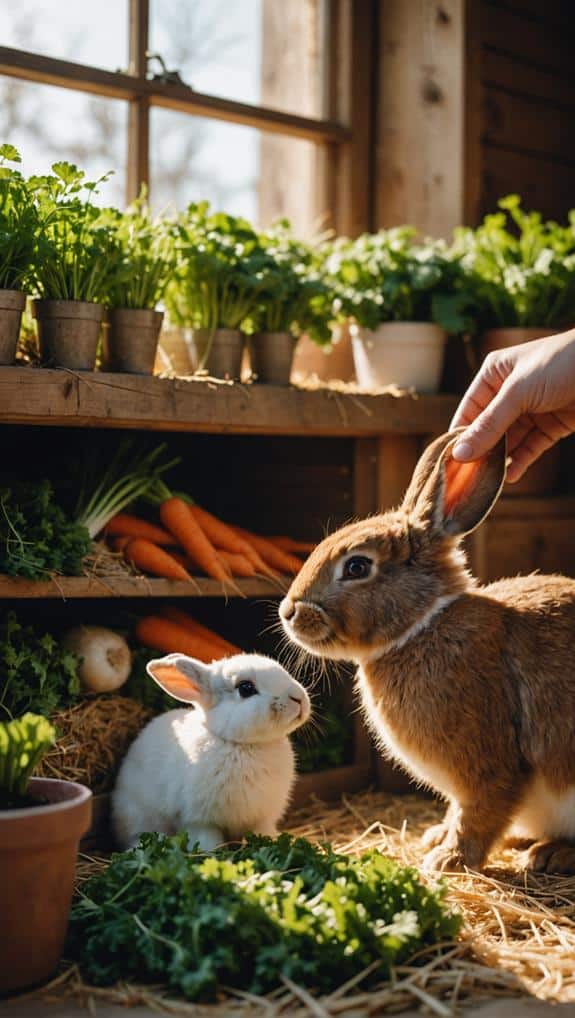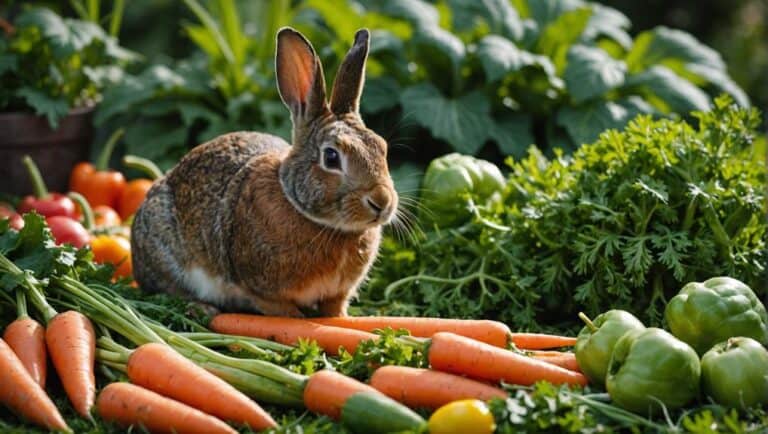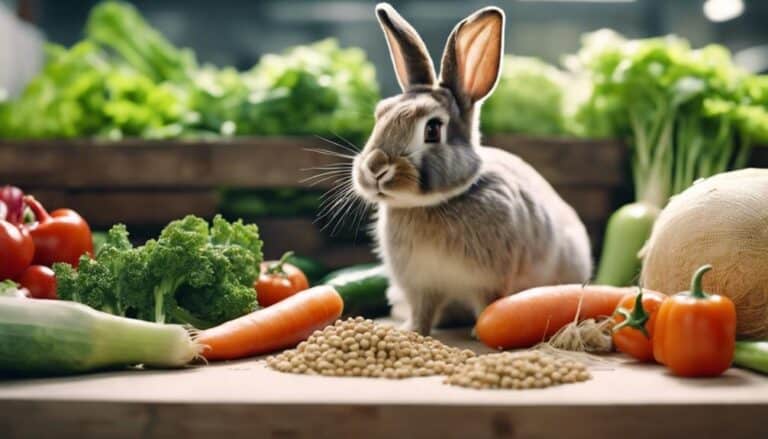While baby rabbits thrive on a balanced diet, the consequences of neglecting their nutritional needs can be severe. You might think that a simple mix of greens is enough, but without the right vitamins, these young animals face serious health risks. Ensuring they receive adequate amounts of vitamins A, D, and E is essential, yet many caretakers overlook this aspect. What steps can you take to guarantee their dietary intake is ideal, and how can you recognize the signs of deficiencies before it's too late?
Contents
Understanding Nutritional Needs

Understanding the nutritional needs of baby rabbits is fundamental for their healthy growth and development. Young rabbits thrive on a high-fiber diet, which should constitute about 19% crude fiber to support peak gastrointestinal function. This fiber is essential for their digestive health and prevents common gastrointestinal issues.
A balanced diet is particularly important during these formative stages, as it not only promotes healthy weight management but also supports overall well-being in young rabbits, as highlighted in a balanced bunny diet.
Alongside fiber, adequate protein levels ranging from 15-19% are critical to encourage muscle growth and sustain energy during their formative stages. It's equally important to maintain a proper calcium-to-phosphorus ratio in their diet to prevent skeletal problems and guarantee healthy metabolic functions.
Vitamin A plays a key role as well; it's necessary for maintaining vision and skin health. A deficiency can lead to significant developmental issues, which you want to avoid at all costs.
Introducing solid foods around 3-4 weeks of age is significant, as this change helps to prevent digestive complications. You should monitor these changes closely to address any potential nutritional deficiencies, making sure your young rabbits receive a balanced diet.
Essential Vitamins for Growth
How can you ascertain your baby rabbits get the necessary vitamins they need for ideal growth?
Providing a diet rich in necessary vitamins A, E, and D is critical for their overall development and long-term health. Vitamin A is crucial for their vision and skin health; deficiencies can lead to poor growth rates and incoordination. Guaranteeing an adequate intake of this vitamin is imperative. Moreover, vitamin E plays a significant role in supporting their immune system and promoting healthy skin. It’s important to recognize that these essential vitamins for dog breeds can also help in preventing various health issues, ensuring a longer and happier life for your furry companions. Lastly, vitamin D is vital for calcium absorption, which is essential for strong bones and teeth, making it a key component of a balanced diet for dogs.
Vitamin E acts as a powerful antioxidant, playing a significant role in reproductive health. It helps prevent fertility issues in both growing rabbits and breeding does, making it a key component of their diet.
Ultimately, vitamin D is necessary for calcium metabolism and proper bone development. Without it, baby rabbits could develop rickets, severely impacting their skeletal health.
To prevent these deficiencies, focus on providing a balanced diet that includes high-quality hay, fresh vegetables, and a well-formulated rabbit pellet.
Regularly monitoring their diet will help assure that your baby rabbits receive the necessary vitamins needed for peak growth and health. By being proactive, you can support their journey into healthy adulthood, enhancing their quality of life.
Signs of Vitamin Deficiency

Spotting signs of vitamin deficiency in baby rabbits is vital for their health and development. You should be vigilant for symptoms that may indicate a lack of key vitamins. For instance, vitamin A deficiency can lead to poor vision and skin issues, evidenced by rough or scaly skin and difficulty seeing in dim light.
Additionally, guaranteeing proper nutrition and monitoring stress management during early development is crucial for maintaining their health, as proper nutrition directly impacts their growth. If you notice lethargy and poor growth, consider that inadequate vitamin D may be weakening their bones due to compromised calcium absorption.
Vitamin E deficiencies might manifest as coordination problems and overall weakness, affecting the rabbit's ability to thrive. Additionally, insufficient fiber intake can lead to significant digestive problems, which not only impact gut health but can also trigger a domino effect of nutritional deficiencies.
Keep an eye out for stunted growth, weakened immune responses, and abnormal coat conditions. These signs can help you detect early nutritional deficiencies, allowing for timely dietary adjustments or veterinary consultation.
Dietary Sources and Recommendations
Recognizing the signs of vitamin deficiency in baby rabbits emphasizes the significance of providing them with a nutrient-rich diet. To guarantee ideal growth and development, you should focus on high-quality hay, fresh vegetables, and specially formulated pellets. A diet rich in fiber content, with at least 19%, is essential to prevent digestive issues and maintain dental health.
Incorporating a variety of dietary components for ideal health can further enhance their nutritional intake and support their overall well-being.
To meet the specific needs of baby rabbits, include leafy greens like kale and romaine lettuce, which provide essential calcium and vitamin A. Calcium is crucial for their skeletal health, while vitamin A supports good vision and skin integrity.
Additionally, incorporating cecotropes from the mother rabbit is important, as these provide beneficial bacteria and nutrients necessary for their early digestive health.
Regularly monitoring their dietary sources is important to prevent deficiencies, particularly in calcium, vitamin A, fiber, and protein.
Monitoring Health and Diet

While caring for baby rabbits, it's essential to monitor their health and diet closely to guarantee they thrive. Regularly check their weights; slow growth can indicate dietary issues or nutritional deficiencies that may require dietary adjustments.
Daily inspections of their physical condition are important, looking for signs of dehydration or malnutrition, like sunken tummies and wrinkled skin, to catch potential health problems early.
Introducing solid foods around 3-4 weeks of age should be done gradually, providing frequent small meals to prevent overfeeding and encourage healthy eating habits.
Don't forget the significance of a calcium-rich diet for lactating does, who need up to three times their normal food intake to support healthy milk production and avoid deficiencies in their newborn kits.
Lastly, consulting a veterinarian for tailored dietary advice and regular health check-ups is crucial. This practice can help prevent common nutritional deficiencies, such as calcium, vitamin A, and protein, which are essential for the proper development of baby rabbits.
Final Thoughts
In nurturing baby rabbits, you're not just feeding them; you're cultivating their future. By prioritizing a balanced diet rich in crucial vitamins, you lay the foundation for vibrant health and strong growth. Just as a gardener tends to each seedling, your attentive care can prevent the shadow of vitamin deficiencies from stunting their potential. Remember, your commitment to their nourishment today will blossom into the lively, healthy companions of tomorrow. Keep a watchful eye, and let their energy thrive.






